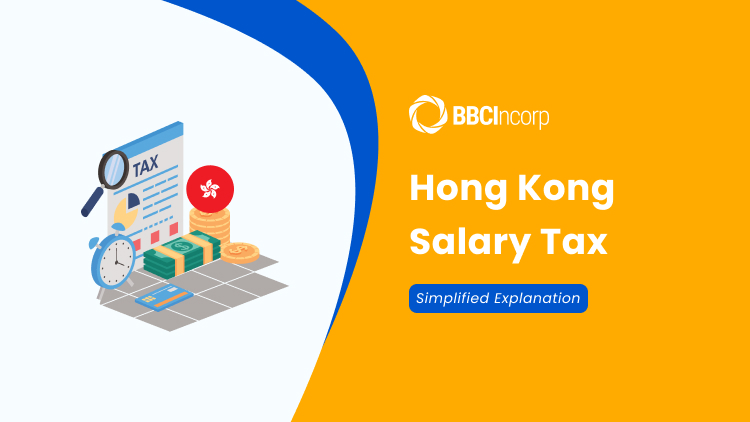About accounting services with BBCIncorp to simplify your financial management and stay compliant with confidence.

The attractively low salary tax rates in Hong Kong are a major draw for many expatriates seeking to work and live in this dynamic city. However, the way Hong Kong implements and processes income tax can differ from other countries. Expats must have a solid understanding of these differences to ensure compliance with local laws.
This article is designed to provide a comprehensive overview of Hong Kong’s salary tax system, highlighting all the key points you need to know. Hoping you’ll be better equipped to navigate Hong Kong’s tax laws and fulfill your tax obligations effectively.
Overview of Hong Kong Salary Tax
Salary tax is a form of direct income tax levied on all income from an office, employment, or pension in Hong Kong. It includes income from salaries, wages, bonuses, leave pay, commissions, gratuities, perquisites, and allowances.
In Hong Kong, salary tax is a significant part of the overall income tax system—alongside property tax and profits tax—which is calculated based on your assessable profit where applicable.
The Salary Tax in Hong Kong follows a territorial basis of taxation, meaning that chargeable income earned within or originating from Hong Kong is subject to this tax. This applies regardless of whether the taxpayer is a resident or non-resident of the Hong Kong Special Administrative Region (SAR).
Specifically, Hong Kong salary tax is imposed on the following categories of income:
- Income earned from employment within the Hong Kong SAR.
- Income derived from holding an office or position within the Hong Kong SAR.
- Income received from a pension originating in the Hong Kong SAR.
Conversely, income earned outside of Hong Kong is generally not subject to this tax, even if the taxpayer is a resident of Hong Kong.
Salary tax is payable by you for each year of assessment, which runs from 1 April to 31 March of the following year.
What are the salary tax rates in Hong Kong?
The salary tax applies to an individual’s net chargeable income after deductions and allowances at the following rates:
| Net chargeable income (After allowances & reductions) | Salaries tax rate |
|---|---|
| For the first HK$50,000 | 2% |
| On the next HK$50,000 | 6% |
| On the next HK$50,000 | 10% |
| On the next HK$50,000 | 14% |
| Above HK$200,000 | 17% |
The salary tax rate ranges from 2% at the lowest income levels to 17% for higher income brackets. However, the maximum tax payable is capped at a standard rate of 15% of their net income (assessable income after deductions but before allowances), which differs from how withholding tax Hong Kong is applied in other tax scenarios.
Essentially, taxpayers will pay the lower of the two calculated amounts: the progressive rate based on net chargeable income or the flat 15% rate on net income.
For detailed information on deductions and allowances allowed, please refer to IRD’s brief guide.
How to comply with Salary Tax obligations in Hong Kong?
To comply with salary tax obligations in Hong Kong, you are required to fulfill the following:
- File the annual tax return accurately and by the specified deadline, reporting your income and any eligible deductions or allowances. Even if there is no income to report, you must still file the form, and declare zero income on receiving tax return from IRD.
- Pay the tax amount by the specified due date.
Both paying the tax and filing the tax return are crucial components of complying with salary tax obligations in Hong Kong. Failure to meet these requirements can result in penalties and interest charges.
Filing annual tax return
As an expat, you must complete, sign, and file the Tax Return – Individuals (BIR60) Form (with the supplementary forms). This Form is crucial for reporting your financial details.
Normally, the Form will be issued to you by the Inland Revenue Department (IRD) around May 1 each year. You are required to complete, sign, and file the Form within one month if you do not own any business, and three months if you were the sole owner of an unincorporated business from the date of issue.
You have the option to file your tax return either online or by postal mail.
Payment of salary tax
After you’ve filed your tax return, the IRD will provide you with a ‘Notice of Assessment.’ This notice specifies the amount of tax you are liable to pay for the given year of assessment and the payment due date.
Payment due dates typically fall in January and April of the following year, depending on your specific tax situation.
See More
Conclusion
Navigating the salary tax system in Hong Kong is a crucial aspect for expatriates working in this vibrant city. Understanding and complying with these tax regulations not only ensures you stay on the right side of the law but also helps in optimizing your financial planning in a foreign land.
Being well-informed about Hong Kong’s tax system demonstrates your commitment to legal and financial responsibilities as an international professional. It is more than a mere formality; it’s about integrating smoothly into the economic fabric of Hong Kong and making the most of your expatriate experience.
If you are planning to set up a business in Hong Kong, feel free to contact us for help at service@bbcincorp.com.
Disclaimer: While BBCIncorp strives to make the information on this website as timely and accurate as possible, the information itself is for reference purposes only. You should not substitute the information provided in this article for competent legal advice. Feel free to contact BBCIncorp’s customer services for advice on your specific cases.
Industry News & Insights
Get helpful tips and info from our newsletter!
Stay in the know and be empowered with our strategic how-tos, resources, and guidelines.






